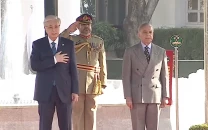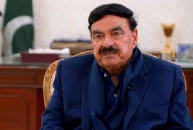Positive Pakistanis: Fountain of hope
To those suffering from mental illness, Dr Haroon Chaudhry brought hope of a better life.

Haroon followed in the footsteps of his father and developed an interest in the speciality of Psychiatry, eventually completing his postgraduate training in Psychiatry it from Austria. In 1985 he started his career as a specialist in mental health in Lahore, working in different hospitals to gain experience. Initially, he began work in a government hospital, then started practicing in a small clinic in his house.
He didn’t have many patients initially but his sense of humour and unshakable optimism soon made him popular and he went from a few patients to 150-200 patients every single day. His optimism was contagious and he would become friends with those who came to him with psychological problems. His patients remedied their problems by talking with Dr Haroon, many would say: “Talking to you heals half of our problems, while your medicine takes care of the other half.” But his charm was not his only aid; his main strength was his hard work. He was willing to work 18 hours out of a 24 hour day to satisfy his patients and gain more knowledge about Psychiatry. His motto in life was: “Work hard, keep good intentions and never justify your wrong-doings.” He would preach these to his patients, colleagues, family and everyone who came his way.
When his father, Dr Rashid Chaudhry passed away, Dr Haroon became the Executive Director of Fountain House, a rehabilitation centre for the mentally unwell. Fountain House has been recognised all around the world, by institutions such as Harvard University, as a model of psychiatric rehabilitation even for developed countries. Run on money that Dr Haroon generated through fundraising and charitable contributions, Fountain House accommodates around 300 to 500 patients at a time. From the poor people of Kashmir and villagers of Balochistan to students from LUMS, Aitchison, barristers and even ex-expatriates who suffer from severe mental illness — Fountain House takes in everyone who needs psychiatric rehabilitation.
Most of the patients in Fountain House are there because their families have abandoned them out of poverty or fair of social stigma. Some were abandoned because their illness was so severe and others were left at Fountain House because they were simply too old for their families to hope that they would recover. Dr Haroon was a beacon of hope for these lost souls, who had been considered pariahs by their own families. Dr Haroon was the saviour who gave those patients shelter, food, support and acceptance. Patients of Fountain House have been treated and have gone on to follow their dreams and professional careers. Raising money for the medicines, shelter, food, education for 300 patients is not easy but Dr Haroon could made it all possible because of his charisma. He organised fund-raising dinners and went all around the world on conferences and spoke about Fountain House. People would get fascinated first by Dr Haroon’s positivity and then by his charitable work and willingly donate their zakaat and sadqa while foreigners would dedicate their savings for such a noble cause.
Fountain House wasn’t Dr Haroon’s sole charitable endeavour. In the rural suburbs of Lahore, the doctor established a free clinic at Ahbab Hospital to provide medical services to about 150 patients every Wednesday. For the last 15 years of his life, Dr Haroon went to the clinic every week. I myself have been to Ahbab Hospital on a Wednesday and the number of patients there was overwhelming. Imagine 150 poor patients with their families pushing and shoving to make their way to see ‘Doctor Sahib’. Dr Haroon saw a lot of patients — some even came from Afghanistan. He once asked a patient, “You came all the way to see me — what if I had been absent from the clinic this Wednesday?” The patient replied “Doctor Sahib, no offence but the man who told us about you said that you see patients here for free every Wednesday without fail. And the only thing that could stop you from coming here on a Wednesday would be if you had left this world forever.”
Dr Haroon was so affected by his words that he promised all his patients there that he would indeed never miss a Wednesday as long as he lived. This promise was so important to him that when his daughter had a child in Canada, he flew to Canada on a Thursday and insisted on catching his flight back to Pakistan the following Tuesday so that he would be in time for his usual Wednesday at Ahbab Hospital. Dr Haroon suffered from a heart attack after seeing his free patients at Ahbab Hospital on Wednesday 29th September, 2010. After being admitted and operated upon at the hospital, he passed away on Tuesday, 5th October 2010. That Wednesday, when he did not come for the patients who had gathered to see him at Ahbab Hospital, they knew that he had gone forever, for he would never leave them waiting otherwise.
Published in The Express Tribune, Sunday Magazine, May 8th, 2011.



















COMMENTS
Comments are moderated and generally will be posted if they are on-topic and not abusive.
For more information, please see our Comments FAQ